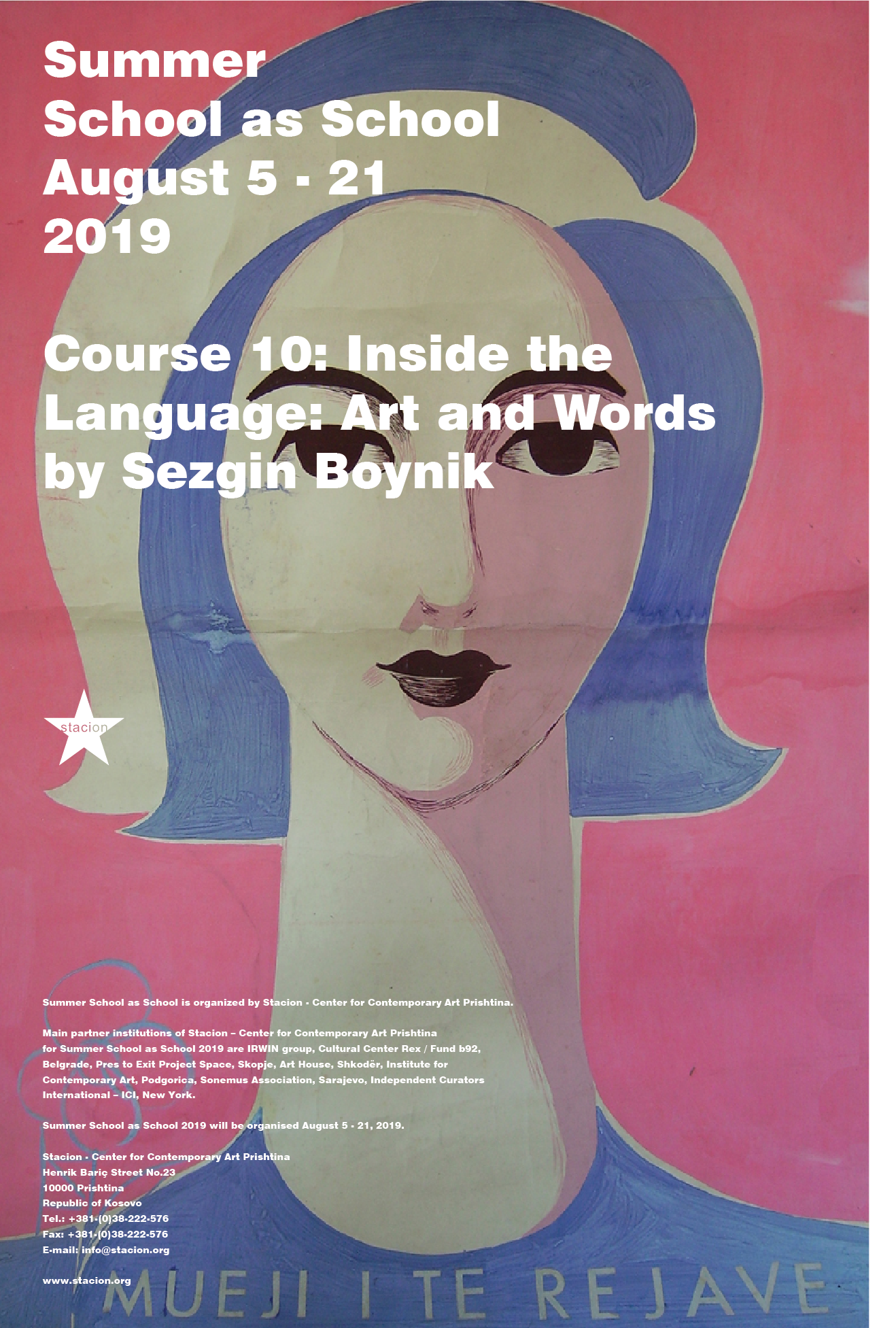
Course 10: Inside the Language: Art and words
by Sezgin Boynik
14 – 21 August, 2019
Course Description
"Inside the Language" will examine the status of language in the art production. The main philosophical argument of the course is that there is nothing that is unrepresentable or unspeakable. The starting point is that this radical, secular and materialistic possibility is achieved through language. The thesis of the course is this: language ties us to the world. As Raymond Williams wrote, “a definition of language is always, implicitly or explicitly, a definition of human beings in the world.” Whether that is a world of imagined unity or the world of class struggles, it is always through language that we relate to it. In a similar way, art is also the currency of language, even though art is usually portrayed as something beyond words. This contradictory relationship between language and art will be a focus of the course.
Parallel with this secular and materialistic possibility there is also something that is inherently contested, and riddled with conflict and antagonisms, in the realm of language. A language is a machine of reproduction, but at the same time, the most amazing transformations happen in it. The leitmotif for our course is the definition of ‘word’ that Roman Jakobson formulated when he referred to Charles Sanders Peirce: “The context [of language] is variable, and the particular meaning of the word undergoes renewal in each new context: herein lies the creative power of the verbal sign. Through this creative force, the sign opens a path towards the indefinite future, that is, it anticipates, it predicts things to come.”
The aim of the course is to highlight these discrepancies by focusing on language as the form of art, involving questions such as what it means when artists write, in which way the writing part of art theory (meaning the theory that artists produce following their practice) is different from the text as art, how constraints of everyday language are challenged through experimental art language and where lie the limits of language in the frame of artistic representation (i.e. the question of abstraction and language). In order to do this, we will examine the work of Russian Futurist and Formalists from the twenties, writings of Malevich, Shklovsky and the Formalist’s theses on Lenin's language; Situationist International and the dictionary of captive words, the legacy of the surrealist movement, speaking outside of the Cold War militarist machinery, Mustapha Khayati's writings, slang, punk poetry; conceptual art language as speaking outside of institutions, the work of Art & Language, the theory of collective speech; the legacy of Black Audio Film Collective as the poetry of decolonization, the language of riots and uprising, theories of nation-language of Ngugi Wa Thiong'o and sound shapes of Edward Kamau Brathwaite.
Biography
Sezgin Boynik is a theoretician based in Helsinki. He completed his PhD on Yugoslav “Black Wave” cinema. He co-edited Nationalism and Contemporary Art: Critical Reader (MM & Exit, 2007) and History of Punk and Underground in Turkey (BAS, 2008). Recent publications include Noise After Babel: Language Unrestrained (Spector Books, 2015, with Minna Henriksson), In the Belly of the Beast: Art & Language New York Project (Rab-Rab Journal Vol. 4, No. 2, 2017, with Michael Corris) and Coiled Verbal Spring: Devices of Lenin's Language (Rab-Rab Press, 2018). He is currently working on a monograph about the theoretical and political context of Black Audio Film Collective and on the collection of Yugoslav concrete poetry. He is editor of Rab-Rab: Journal for Political and Formal Inquiries in Art, and Rab-Rab Press, an independent publishing platform based in Helsinki.
Participation
10 participants will be selected to participate in this course. Eligible participants must read the Terms, fill out the application form, upload the required documents and submit the application form. Incomplete applications will not be considered.
Scholarships are available for participants from Kosovo.
A limited number of scholarships, that cover the participation fee, are available for international participants.